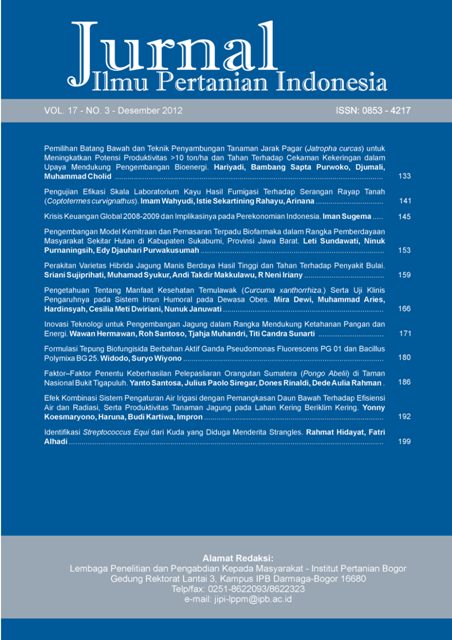Krisis Keuangan Global 2008-2009 dan Implikasinya pada Perekonomian Indonesia
Keywords:
economic recovery, financial crisis, impact of crisisAbstract
The global financial crisis that occurred in 2008-2009 was the worst financial crisis in 80 years, even the economists in the world called it as the mother of all crises. The subprime mortgage crisis in the United States eventually manifested into a world-wide financial crisis. No single country is free from the effects, including Indonesia. This study aims to analyze the global financial crisis, the sources of the cause, the mechanisms of the crisis emergence, and to identify the implications of the crisis on financial sector and real sector, as well as employment and poverty. The results showed that the country has a relatively high poverty rate and unemployment rate than it should. If there is no crisis, the level of poverty alleviation and reduction of unemployment should be at a better rate. In addition, it was found that the impact of the global crisis relatively stronger to the rural households than to urban households. Therefore, because the rural labor market is much more flexible than that in urban areas, the impact of global crisis on rural unemployment rates is relatively weaker as well.
Downloads
References
Ajakaiye O, Fakiyesi T. 2009. Global Financial Crisis Discussion Series Paper 8: Nigeria. London (GB): Overseas Development Institute.111 Westminster Bridge RoadSE1 7JD. 2009.
Blanchard O. 2009. "Where Are We in the Global Crisis?" Carnegie Endowment. Thursday. April 30, 2009 2:00 PM.
Breisinger C, Collion MH, Diao X, Rondot P. 2010. Impacts of the Triple Global Crisis on Growth and Poverty in Yemen. IFPRI Discussion Paper 00955. Washington DC (US): International Food Policy Research Institute.
Eichengreen B, Baldwin R. 2008. ‘What G20 Leaders Must Do to Stabilise Our Economyand Fix the Financial System’. London (GB): A VoxEU.org Publication CEPR.
Krugman P. 2009. ‘Return of Depression Economics?’ Final Keynote Address at the 2009 Princeton Colloquium on Public and International Affairs, Princeton University, Woodrow Wilson School of Public and International Affairs, April 18 2009.Tersedia pada http://www.youtube.com/watch?v=r5r17NrIMRY.
Republika. 2009. Krisis global ciptakan 57 ribu penganggur. Republika, Rabu, 24 Juni 2009.
Rogers C. 2008. The global economic crisis of 2008: Some thoughts on causes and remedies, Economic Issues, No. 25. South Australian Centre for Economic Studies, December 2008.
Stiglitz JE. 2003. Globalization and its Discontents, New York (US): WW Norton & Company.
Strutt A, Walmsley T. 2009. Trade and sectoral impacts of the global financial crisis. Makalah pada the ARTNet Asia‐Pacific Trade Economists’ Conference, Bangkok, 2‐3 Nov 2009.
Sugema I. 2001. Bank Failures During The Indonesian Crisis: Imprudent Banking or Bad Luck?” Working Paper in Trade and Development, Division of Economics, Asia Pacific School of Economic and Management, The Australian National University.
Sugema I, Rajan R, Siregar R. 2003. Why was there apre-crisis capital inflow boom in Southeast Asia?. J Int Develop. 15(3): 265–390.
Sugema I. 2001. The origins of banking crisis in Indonesia. Seminar ISEAS. Singapura (SG): Institute of Southeast Asian Studies.
Sugema I. 2007. Ten Years After Crisis: What Has Been Learned?.Makalah “Ten Years After Crisis” di Bank Indonesia.
Downloads
Published
Issue
Section
License
This journal is published under the terms of the Creative Commons Attribution-NonCommercial 4.0 International License. Authors who publish with this journal agree to the following terms: Authors retain copyright and grant the journal right of first publication with the work simultaneously licensed under a Creative Commons Attribution-NonCommercial 4.0 International License. Attribution — You must give appropriate credit, provide a link to the license, and indicate if changes were made. You may do so in any reasonable manner, but not in any way that suggests the licensor endorses you or your use. NonCommercial — You may not use the material for commercial purposes.




















